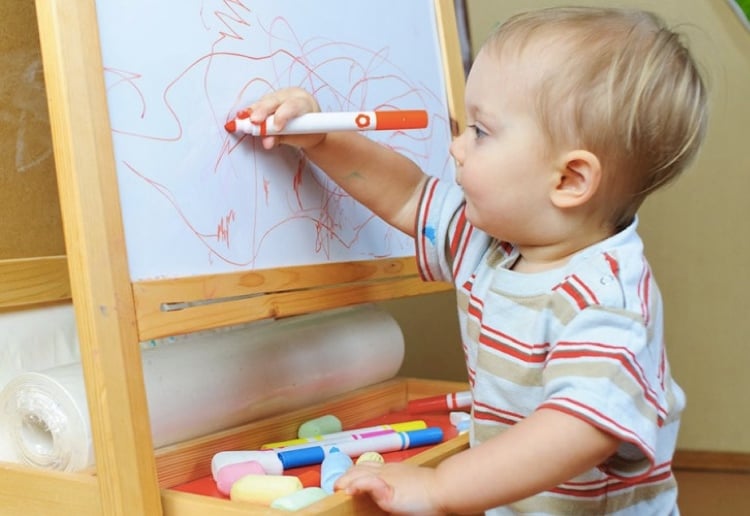The developmental milestones of children is a wonder to behold. In such short amounts of time, they can show immense advancements in their physical and emotional ability, which is incredible to witness.
The below milestones are a rough guide to how you can expect your child to develop physically, emotionally and cognitively from the ages of 3 months to 3 years. However, it’s important not to heed these as gospel – every child develops at their own pace.
3-6 month milestones
Motor skills
At 3 months old, your baby should be able to hold their head erect, and lift their upper chest using their forearms when lying on their tummy. They should also be able to briefly hold a rattle.
Between 4-6 months, your baby should be able to stay sitting up, roll from their tummy to their back (and vice versa), stand up with support and reach for toys around them.
At 3-6 months your baby will begin to cry, laugh, smile, chuckle and “coo”, and will babble to get attention. You may start to differentiate between sounds to gauge what they want.
Your baby will also begin to listen and react to sounds around them
Sensory skills
Your baby will show an interest and curiosity in things around them, i.e. toys, which they will often bring to their mouth as-as way of inspection. At this age, they should also be easily calmed by gentle rocking and touching.
Feeding
Your baby will start to show an interest in the foods you are giving them. They will enjoy soft foods such as pureed and mashed fruits and vegetables and will open their mouths when they see food approach.
7-12 month milestones
Motor skills
Between 7-12 months your baby should be able to sit up without support. They may also have control when lying on their tummies and show early signs of crawling.
By the age of 12 months, your baby may be able to hold onto furniture to pull themselves to standing and may take a couple of steps without support.
Communication skills
Amazingly, your baby will start to recognise and react to words and names, including their own. They will often look at a person when their name is spoken aloud, and participate and light two-way communication by shaking their head for “no”, and use babbles and gestures when they want something. They may also start using words like “mama” or “dada” to get attention, and may respond to simple demands.
Sensory skills
Your baby will show more interest in objects and their surroundings, examining shapes and textures using their hands and mouth. They may also enjoy listening to music and “move” in time to the rhythm.
Feeding
A baby between 7-12 months will be able to sit in a highchair and become more confident holding a bottle. They will also be introduced to thicker pureed and mashed foods.
13-18 month milestones
Motor skills
Your baby may begin walking independently between the ages of 13-18 months.
Communication skills
It’s common for babies around 15 months-old to know 5-10 words, and be able to combine simple words, sounds and gestures to communicate. They will also show obedience when asked to do something and will answer simple questions. They will also show a longer attention span and greater interest in other people and their surroundings.
Sensory skills
By the time your baby is 18 months old, they will have a more routine sleeping schedule, meaning you will get more interrupted sleep at night.
Feeding
At this age, your baby will be showing an ever-increasing interest in food and will be able to drink from a cup.
19-24 month milestones
Motor skills
Toddlers aged 19-24 months are often walking and running, and will be able to walk up and down stairs (though aided).
They will enjoy drawing and scribbling with pens and crayons and may begin to show a preference in using their left or right hand.
Communication and emotion
Between 19-24 months, your toddler will enjoy participating in play with other groups of children. They may also show better engagement and interaction with others by holding eye contact and listening more intently.
You may choose to enrol your toddler in an early childhood daycare centre so that they can continue to develop their social skills.
Sensory skills
Toddlers will likely begin toilet training – or show signs that they are ready to be toilet trained – between 18 months and 2 years old. These signs include making it known when their nappy needs changing, being able to pull down their own underpants or showing an interest in others using the toilet.
The speed at which toddlers complete toilet training is dependent on their ability to pick up new skills, but most will feel confident to use a potty before the age of 3. Night-time toilet training, however, can take longer.
Feeding skills
By this age, toddlers will show the ability to feed themselves with their hands, but they may also develop a liking for certain foods, or become fussy with what you give to them.
2-3 year milestones
Physical skill and ability
Between 2-3 years, toddlers will likely be able to wash when they are in the bath and help to get dressed and undressed.
At 3 years, your toddler will become more active and mobile. They may be able to:
-
Throw, kick and catch a ball
-
Get dressed, with your help
-
Ride a tricycle
-
Walk up and down the stairs while holding your hand
-
Draw shapes on paper
-
Turn a door handle
-
Turn pages of a book
Communication and emotional
Toddlers between the ages of 2 and 3 years will develop monumentally in regards to their communication ability and emotions.
At 3 years old, toddlers show a lot more social skills. They will enjoy playing with other children and will begin to mimic things that you do – i.e. opening and closing a door, using a remote control and cooking.
Your toddler will expand their vocabulary drastically between the ages of 2 and 3 years. At 2 years they may know around 50 words and their sentences may be 2-3 words long. By the age of 3, they may know up to 200 words and be able to communicate using longer sentences and understand nouns, verbs and past tense.
They will also become more attuned to the people around them. Because of this, they can begin to develop empathy and show care and consideration for others. However, it can also manifest in temper tantrums, as they are often confused and cannot express themselves fully, but are also aware that what they do can affect your emotions.
Feeding skills
Children aged 2-3 will be more comfortable feeding themselves using a spoon or fork (though perhaps still messily).
Conclusion
Babies and toddlers are incredibly malleable, so it is important to encourage child development – especially early years development – as much as possible.
As a parent or guardian, you should engage with your young child, stimulate them with new toys, surroundings and people, feed them nutritious foods and ensure they get all the sleep they need to grow.





















-

-
-
ashna9 said
- 11 Jan 2019
-

-
-
Cookfromscratchmum said
- 09 Jan 2019
-

-
-
curlytops said
- 07 Jan 2019
-

-
-
Blossom said
- 07 Jan 2019
Post a comment7:14 pm
2:41 pm
8:52 pm
4:02 pm
To post a review/comment please join us or login so we can allocate your points.